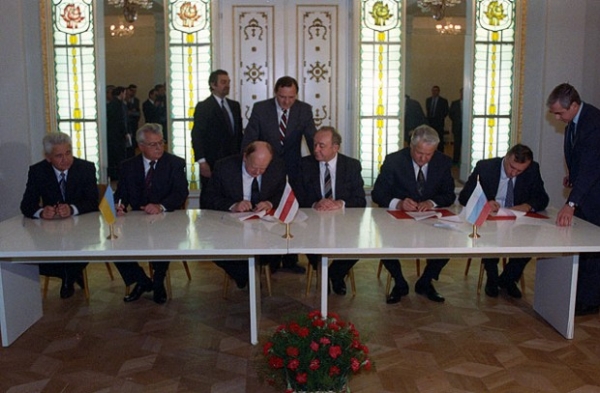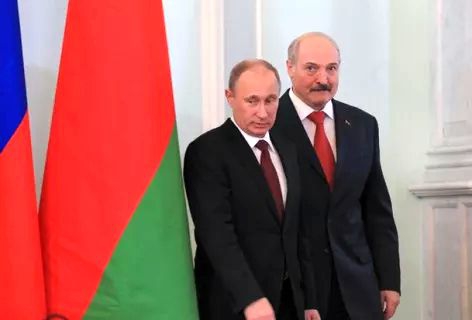
The meeting in Belovezhskaya Pushcha. Photo: Yuriy Ivanov / RIA Novosti
FOM: Russians still feel nostalgic for the USSR and is considered a major cause of its collapse the actions of politicians, not objective reasons
The public opinion Foundation (FOM) conducted a survey about the attitude of Russians to the collapse of the Soviet Union. Sociologists asked respondents to recall how they perceived the Belovezha accords on the dissolution of the USSR and formation of CIS and what were their first feelings on this occasion.
15% of Russians have experienced, on 8 December 1991 resentment and bitterness. People felt “bitter disappointment” “disappointment and pain” and a perceived Belovezhskaya agreements “as a tragedy, as trouble”. 7% described their experiences as negative and just negative
“Well, wasn’t love”, — summed up his impressions of the collapse of the Soviet Union one of the participants of the survey.
5% of respondents didn’t even notice the end of the Soviet era: “I cared”, “no emotion”, “did not respond”. As many people, on the contrary, were greatly perplexed: “I was in a mild shock, everything was clear,” “taken aback”.
4% of respondents got angry on that December day: people felt “anger and outrage”, “outrage”, believed that “in no event it was impossible” to divide the country. Someone’s first emotion was “protest, of course.”
3% was frightened and felt anxiety for the future: “was anxious, afraid of civil war.” 2% recalled having felt betrayed and wished “to the wall to put the” politicians, signatories of the Belovezhskaya agreements.
“Going and down-and divided the country,” summed up one Respondent.
So, on the contrary, sincerely glad to the disintegration of the country: “I was glad”, “was happy”, someone even had the “inspiration”.
Only 1% of respondents, the events of 8 December 1991 was associated with changes for the better: “hope for the best, freedom and democracy”, the growing prosperity. Another 1% could be waiting the dissolution of the USSR, because “everything was”: “was perceived without joy, but stopping it was impossible.”
While half of the respondents are unable to talk about their emotions regarding the Belavezha accords: “I don’t remember”, “were little” or “not yet born”. Another 6% of respondents found it difficult to answer.
The majority of respondents (54%) believe that the main reason for the collapse of the USSR are the actions of then politicians. Only 17% of the decay is called the objective problems and contradictions accumulated in the Soviet Union. 29% of respondents find it difficult to say why the Soviet Union collapsed. In 2006, 58% in the decay considered politicians, 21% — objective problems. Interestingly, in 2001 in the collapse of the Union politicians have accused the 71%, and only 16% referred to domestic political factors.
FOM also leads multi-year statistics of the responses to the question “do You personally regret that the Soviet Union collapsed?”.
In 1992, 69 per cent were sorry, the others are not (then the answer is no one difficult).
Peak nostalgia for the Soviet Union began in 1999: 85% regretted the collapse of, 11% — no.
In 2000-2010 years, fewer Russians regret the collapse of the USSR: in 2001 — 79%, in 2006 — 62%, in 2011 — 51%.
In 2011, 19% of respondents said that they did not regret the Soviet Union, and as much as 30% could not answer this question.
Now 54% of respondents regret the collapse of the USSR, 25% no, 21% undecided.
However, the majority (10%) the main cause of your feeling called nostalgia for the friendship of peoples: “all together — all 15 republics”, “United lived closer”; “lived together, and now some kind of feud between the former republics”.
As many people believe that the USSR was better than in contemporary Russia: before “was better to live to simple people”, and now “everything has changed for the worse”. For one Respondent, “everything good left in the USSR”. 9% ‘m sorry that the Soviet Union collapsed, because “then there was stability”, “reliability” and “confidence in tomorrow”. “Peace was,” recalled one interviewee.
7% regret, because “there was great power”, and now the status of a “powerful country” is irrevocably lost and Russia “lowered below a plinth”.
Someone with very warm memories about the social and economic spheres:
5% regret, because “in the USSR has always been the job” and “now hard to find”;
4% — because “the prices were good” and now “do not correspond to the salary”;
3% say quality and free health and education;
2% remembered free housing.
2% of respondents named the cause of regret for missing care of the people: then the “government take care of the people”, and now the Russians — “not people, but slaves, the attitude towards us bestial”.
The same is said about the lack of social stratification in the Soviet Union and the current “the stratification of rich and poor”. And someone regrets the collapse of the Soviet Union, because “it was another spirit, romance”.
“This is the whale did. All about it I regret,” retorted one Respondent.
<pre style=”text-indent: at 35.45 pt;”>Yuri Prokofiev. Photo: Valery Khristoforov / Photokhronika TASS</pre>
Only 12% believe that today it is possible to recreate the USSR. The majority (74%) believes that it is impossible.
In 2006 the ratio was almost the same: 14% and 73%, respectively.
In 2001, 30% believed that the USSR is still possible to recreate, and 58%, which is impossible.
The former head of the Moscow city Committee of the Communist party Yuri Prokofiev in conversation with the “Russian planet” noted three main reasons why many, in his opinion, still have warm memories of the Soviet era: social, ethnic, and cultural.
According to the Communist, nostalgia towards the Soviet Union would not be, if the current “social and economic system” would show an advantage over the Soviet system and “if would become clear that the collapse of the USSR not only did not worsen people’s lives, but also improved”.
“And why nostalgia? Was order! says Prokofiev. — My mother-in-law said when it was hard: “the Soviet government will not give the abyss!””.
Companion RP noticed that if under Soviet rule and corruption was, in any case not in “large size” as it is today. Among other things that people can remember, he said free rent, for which though long standing in the queue, but received, as well as “quite explicit social mobility”, practically disappeared with the collapse of the USSR.
“Life has not improved, and only complicated, says Prokofiev. — Can you give an example. I have a son — candidate of economic Sciences, graduated from Moscow state University, with a good track record. But his company closed and he lost his job at age 50. Seven months could not find work, because they take only up to 45! In Soviet times this would not have happened”.
In addition, according to Prokofiev, many Russians are impressed by the Soviet concept of “friendship of peoples”, which Belovezhskaya agreements actually cancelled. After the collapse of the Tajiks and Uzbeks became known as “archies”, says the interlocutor of the Republic of Poland, and ethnic friction even between Russians and Ukrainians.
Many, even among the young, continues in the twenty-first century to appreciate Soviet culture. Prokofiev notes that during the holidays you see them on TV very often “old Soviet films and sing songs of the great Patriotic war”.
“Culture, which was in Soviet times, was the successor of culture of the Russian Empire — studied Turgenev, Pushkin, Tolstoy. And now what to learn?” — wonders the Communist.








